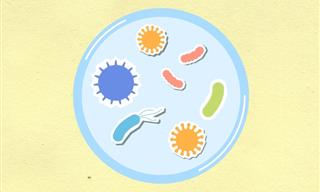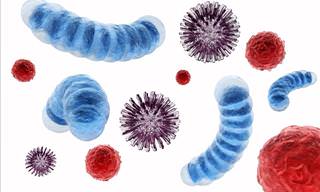In 1945 Howard Florey and Alexander Fleming were awarded a Nobel Prize in Medicine for their role in creating the first mass-produced antibiotic. Antibiotics were indeed a great breakthrough in the world of medicine - when used properly and safely, these powerful agents can be life-saving.
However, there are a few common misconceptions about antibiotics, bacteria, and antibiotic resistance that can often lead to harmful misuse. In this article, we’ll discuss the most persistent myths regarding antibiotics that healthcare providers want you to stop believing.
1. Myth: The body can become resistant to antibiotics
This is one of the most common misconceptions surrounding antibiotics. Antibiotics stop bacterial infections by killing the bacteria or preventing them from reproducing. It isn’t your body but rather the bacteria that can become resistant to antibiotics. Bacteria can even pass this resistance on to each other via genetic 'darts'.
When antibiotics aren't taken correctly, the risk of new strains of resistant bacteria forming increases. “If the bacteria aren’t fully destroyed, you may get sick again. And the bacteria that remain can mutate and develop resistance to the antibiotic.” explained Dr. Benjamin N. Gilmore of Cedars-Sinai Medical Center in Los Angeles. That’s why you’re always told to complete the prescribed treatment plan even if you start feeling better.
However, the notion that it's impossible to develop antibiotic resistance as a result of correct use isn’t true either. Appropriate use applies the same selective pressure as does inappropriate use, so resistant bacteria can potentially form even if the antibiotics are taken correctly. The difference is that we can and should stop inappropriate use because it offers no benefit. In contrast, the benefits of the appropriate use of antibiotics significantly outweigh the risks. To learn more about antibiotic resistance and what's being done to fight it, check out our previous article All You Need to Know About Antibiotic Resistance.
2. Myth: If you've never taken antibiotics you cannot get a resistant infection
While having taken antibiotics in the past does increase your risk of getting an antibiotic-resistant infection, it is possible for someone who has never taken antibiotics to get one too.
Around 10% of the population carries resistant bacteria in their bodies, according to Antibiotics Research UK. These resistant strains can arise in a number of ways, including spontaneously, and through transmission from person to person.
Related: Guide: What to Eat Before and After Taking Antibiotics
3. Myth: It's okay to use someone else’s leftover antibiotics
Antibiotics should only be taken when they’ve been specifically prescribed for you. You might have a friend or family member that had the same symptoms as you and were treated with antibiotics. Or you might suffer from an issue you are already familiar with and have been prescribed antibiotics in the past for it. Either way, taking someone else’s or your own leftover antibiotics without consulting a doctor is never a good idea.
According to several healthcare providers, it’s a lot harder to help patients who have already taken antibiotics without being diagnosed, because It can be difficult to tell which symptoms are from the actual illness and which are side effects from the medication.
4. Antibiotics can be used to treat colds and flu

The common cold and the flu are caused by viruses, not bacteria, therefore antibiotics are not a suitable treatment for these illnesses. Bacteria and viruses are two different microorganisms. The main difference between the two is that bacteria can live in almost any conceivable environment, including the human body, while viruses are a non-living collection of molecules that need a host, like the human cells, to survive. In other words, while bacteria are normal living creatures, viruses are parasites that cannot exist on their own. As such, they are usually much smaller than bacteria.
Taking antibiotics against viral infections like the cold and the flu is ineffective at best, and in some cases could even make you feel worse. There are some ailments - such as pneumonia, meningitis, and diarrhea - that can be caused by either bacteria or viruses. You should always see a doctor if you have a high fever (over 101°F\38.5°C) and your symptoms linger for a period longer than 7 days. These can be signs that your symptoms might not be viral and that you have a bacterial infection.
Related: Virus vs Bacteria: Why It’s Key to Know the Difference!
5. If you don't take your antibiotics correctly it does not affect anyone but you
As we established, misuse of antibiotics increases the risk of resistant strains forming. The problem is that by allowing this, you don’t just harm your own health but you put others at risk too, as these new strains can now infect other people.
Antibiotic resistance has become a worldwide health threat, according to the CDC. In fact, this crisis seems to be worsening recently due to the Covid-19 pandemic. Despite the fact that Covid-19 is a viral infection, research shows the use of antibiotics has steadily increased along with cases. Of those taking the antibiotics, 79–96% reported not having been infected with Covid-19 but were apparently taking antibiotics inappropriately, believing it would prevent infection.
According to the WHO, 15% of Covid patients develop a bacterial co-infection and might need antibiotic treatment to survive. Appropriate use of antibiotics is crucial to society so that they work when people at high risk, such as those patients, really need them. Dr. Nino Berdzuli, director of the WHO put it best when he said "Everyone has a role to play as an antibiotic guardian".
Share this important information with family and friends
 Go to BabaMail
Go to BabaMail


























































